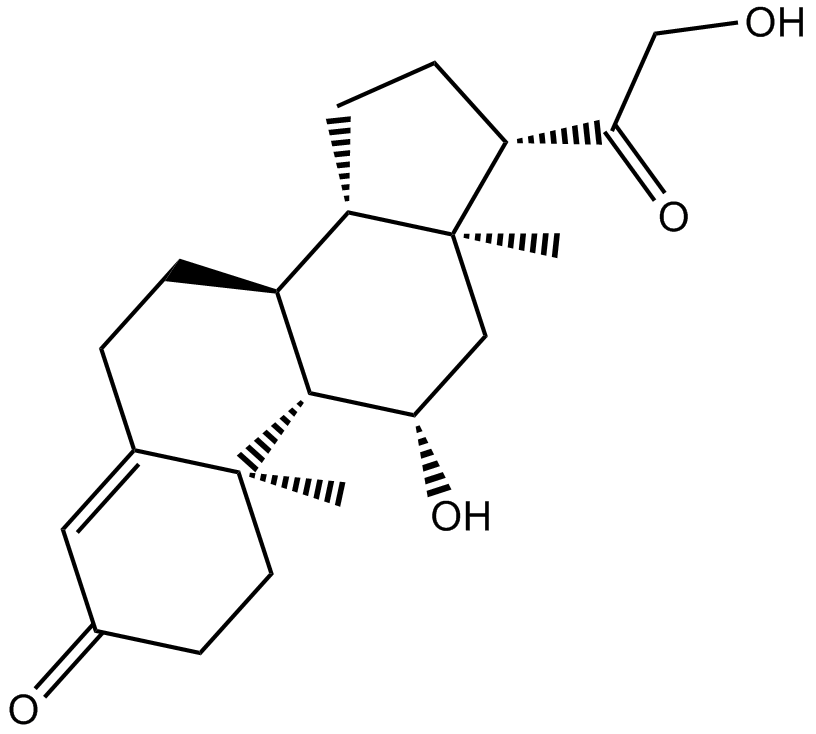Corticosterone (Synonyms: 17deoxy Cortisol, 11β,21DHP, NSC 9705, 11β,21dihydroxy Progesterone) |
| Catalog No.GC12327 |
Corticosterone (17 deoxycortisol) is a glucocorticoid with oral activity and produced by adrenal cortex, which plays an important role in regulating the neuronal function of limbic system (including hippocampus, prefrontal cortex and amygdala).
Products are for research use only. Not for human use. We do not sell to patients.

Cas No.: 50-22-6
Sample solution is provided at 25 µL, 10mM.
Corticosterone (17 deoxycortisol) is a glucocorticoid with oral activity and produced by adrenal cortex, which plays an important role in regulating the neuronal function of limbic system (including hippocampus, prefrontal cortex and amygdala). Corticosterone increased Rab mediated AMPAR membrane trafficking through SGK induced phosphorylation of GDI [1].
Corticosterone has been shown to cause hippocampal damage in a number of ways; altering dendritic tree of hippocampal neurons, apoptosis of hippocampal neurons [2]and inhibition of adult neurogenesis in dentate gyrus[3]. Firstly, high concentrations of Corticosterone were required to induce neuronal death in mouse hippocampal neurons, and secondly, glial cells in cultures were refractory to Corticosterone -induced apoptosis. Corticosterone induced apoptosis in primary cultures of hippocampal neurons in a dose dependent manner. Significant apoptosis started to be seen with 50 µM Corticosterone, and the number of apoptotic cells increased with increase in Corticosterone concentration [4].
Corticosterone-treated male mice were more severe whole-body insulin resistance in the, the high blood insulin concentrations upon corticosterone treatment resulted in lower glucose production in male mice but not in female mice. Because GCs stimulate and insulin suppresses hepatic gluconeogenesis, it is hard to separate the contribution of these two factors in the control of EGP. Quinn et al[5] have shown that female mice have a higher hepatic susceptibility to GCs. Thus, more pronounced actions of GCs in female mice might overrule the inhibitory effect of insulin on EGP or, alternatively, the FBG levels of corticosterone-treated mice were at their lowest limit, which requires EGP to prevent symptomatic hypoglycemia. Corticosterone treatment had opposite effects on GCR in male and female mice. GCR tended to increase in female mice but tended to decrease in male mice. These findings confirm that peripheral insulin resistance was more severe in corticosterone-treated males than in corticosterone-treated females because the elevated insulin levels by corticosterone treatment should have increased GCR substantially in both sexes. Altogether, The sex-differential effects of high-dose corticosterone treatment on insulin sensitivity were mainly driven by the more pronounced insulin resistance of peripheral tissues in male mice [6].
References:
[1] Gasser PJ, et al. Corticosterone-sensitive monoamine transport in the rat dorsomedial hypothalamus: potential role for organiccation transporter 3 in stress-induced modulation of monoaminergic neurotransmission. J Neurosci. 2006 Aug 23;26(34):8758-8766.
[2] Liu B, Zhang H, Xu C, et al. Neuroprotective effects of icariin on corticosterone-induced apoptosis in primary cultured rat hippocampal neurons[J]. Brain research, 2011, 1375: 59-67.
[3] Yu I T, Lee S H, Lee Y S, et al. Differential effects of corticosterone and dexamethasone on hippocampal neurogenesis in vitro[J]. Biochemical and biophysical research communications, 2004, 317(2): 484-490.
[4] Latt H M, Matsushita H, Morino M, et al. Oxytocin inhibits corticosterone-induced apoptosis in primary hippocampal neurons[J]. Neuroscience, 2018, 379: 383-389.
[5] Quinn M A, Xu X, Ronfani M, et al. Estrogen deficiency promotes hepatic steatosis via a glucocorticoid receptor-dependent mechanism in mice[J]. Cell reports, 2018, 22(10): 2690-2701.
[6] Wei Y, Li W, Meng X, et al. Corticosterone Injection Impairs Follicular Development, Ovulation and Steroidogenesis Capacity in Mice Ovary[J]. Animals, 2019, 9(12): 1047.
Average Rating: 5 (Based on Reviews and 38 reference(s) in Google Scholar.)
GLPBIO products are for RESEARCH USE ONLY. Please make sure your review or question is research based.
Required fields are marked with *




